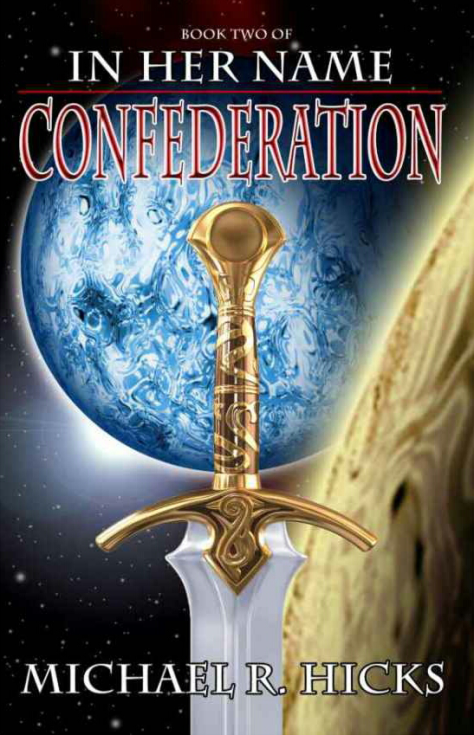“If space is big and mostly uninhabited, it should be safe to assume that any life-forms who really didn’t get along would avoid spending time in each other’s company.
Unfortunately, the fact that said life-forms could avoid each other doesn’t necessarily mean that they would.
When the Others attacked systems on the borders of Confederation territory, Parliament sent out a team of negotiators to point out that expansion in any other direction would be more practical as it would not result in conflict. The negotiators were returned in a number of very small pieces…”
The Confederation and the Others each consist of several sentient life forms wanting a piece of the other side’s action. Unlike the Others, the Confederation had been at peace for long enough to evolve an inability to kill species they defined as sentient, leaving the Elder races desperate for someone to protect them. As Humans had, already, ventured out into their own solar system, they were uplifted on the condition that they, in effect, become the military arm of the Confederation. Once the Krai and di’Taykan were included into the Conferation, that military was expanded.
Valor’s Choice takes us to a world where another warlike species has been discovered. The Silsviss are tough enough that the military want them to join the Confederation and not the Others. Enter the Human Torin Kerr, staff sergeant for the Sh’Quo Company. General Morris, who has never been in a ground battle, orders Kerr to recall the battleworn Sh’quo Company, supposedly to serve as honor guard for the diplomats. On top of that she is given a brand new second lieutenant, the di’Taykan di’Ka Jarret to train. Their relationship is part of the humour of the story, but not for the reasons one might suspect. Jarret is not a bumbling fool. Instead the humour lies in their preexisting relationship.
Neither Kerr nor Jarret are fools. Both of them know that General Morris is planning on something unpleasant for them. Nothing they can do other than be as prepared as they can. On to diplomat-sitting duty they travel. Fortunately, Huff does not fall into some of the tempting traps that are available to authors. Male and female characters are not stereotyped. Nor are the other marines portrayed as stupid fighting machines. Granted, the extras do not have in-depth personalities, but Huff has tried to bring them somewhat to life. Huff manages to blend the three fighting species into a unit all the while maintaining species-typical behaviour. Valor’s Choice is told in third person from Kerr’s point of view and she is the person who is most three-dimensional. I found myself liking her. Another character I really liked was the envoy from the Silvsniss, Cri Sawyes.
There is definitely entertainment value in Valor’s Choice. In the sense that it draws me in and keeps me reading, it could be called escapist. Yet, escapism isn’t all there is to this story. Power and politics are major themes of Valor’s Choice. General Morris is a political general, i.e. he wants advancement at whatever price others have to pay. I strongly dislike people who intend to use other people’s lives to get there. Even when fighting is inevitable, war-hawks tend to up the tally of dead.
Valor’s Choice is also about specieism. Colourism or culturism are inevitable. Humans are programmed to use pre-existing information upon meeting people who look or behave different from themselves and their contemporaries. Humans, Krai and di’Taykan are all war-like. Disparaging remarks are made about the Silvsniss by the marines, but they aren’t said in the same spirit they use on each other. The three military species have worked out their differences (with the help of translators) and joke about those species-specific behaviours (like eating your grandmother). In many ways they find Silvsniss easier to understand than the Elder races the marines babysit. Nor are the Elder races able to comprehend how bloodthirsty the three military species.
Valor’s Choice is a military sci-fi space opera with fighting on the ground. Except for the last bit. Fighting does not begin until after page 100. For me it was easy to get into and was interesting even when action was slow.


















